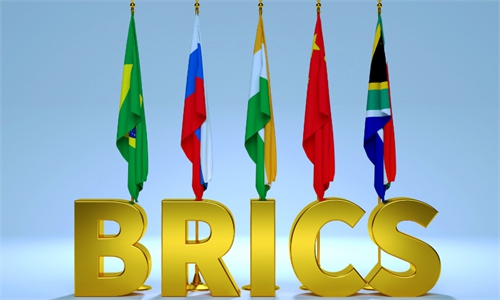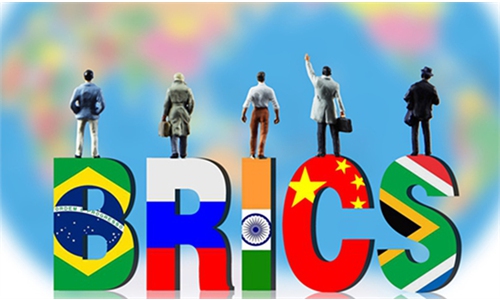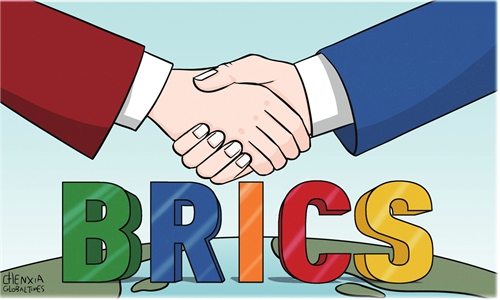BRICS to expand green energy, digital cooperation in bid to boost sustainable development
Closer ties among developing nations help tackle global issues: expert
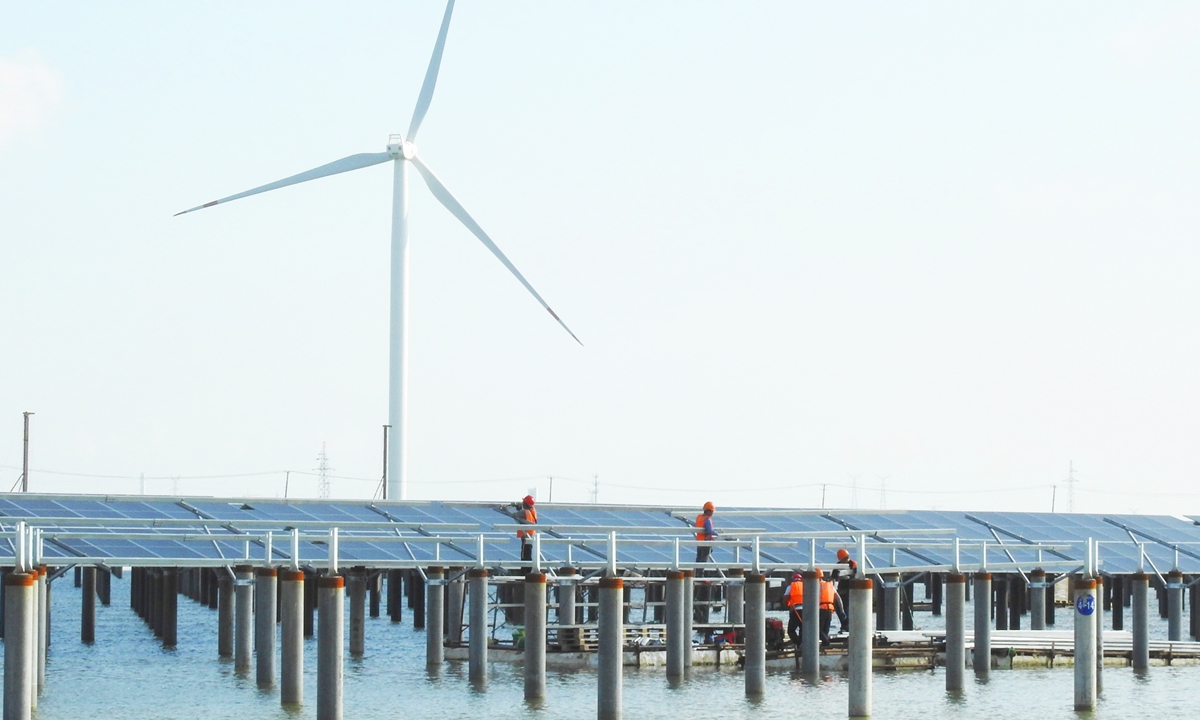
Workers install solar panels at a solar power plant in Lianyungang, East China's Jiangsu Province on Tuesday. The plant is being built over fish ponds, as part of an innovative photovoltaic demonstration projects. Once completed, it will have an installed capacity of 200 megawatts. Photo: cnsphoto
BRICS countries will strengthen cooperation in a wide range of fields, including the digital economy, energy and the green economy, according to the BRICS Summit Beijing Declaration released on Thursday, which reaffirmed the commitment to tackling climate change and fostering sustainable growth.
In an initiative released at the BRICS Business Forum 2022 on Wednesday night, the BRICS business community also pledged to expand cooperation in green energy and the digital economy.
In a clear sign of BRICS' expanding ties with other emerging market economies and developing nations, an innovative "BRICS Plus" mechanism of expanded cooperation is also gaining popularity, which, experts say, provides a powerful answer to address the issue of an unfair and uneven global development model dominated by a single country or bloc.
The Beijing Initiative of the BRICS Business Community, released during the BRICS Business Forum 2022 on Wednesday, called for the promotion of global sustainable development, acceleration of the green transition and an embrace of the digital economy.
BRICS will carry out information exchanges and cooperation in multiple fields, including clean energy, low-carbon technology, and sustainable, resilient infrastructure construction, according to the initiative.
The BRICS-founded New Development Bank offers a glimpse into the group's efforts to tackle the infrastructure and development challenges faced by emerging economies, while advancing the UN's 2030 Agenda for Sustainable Development.
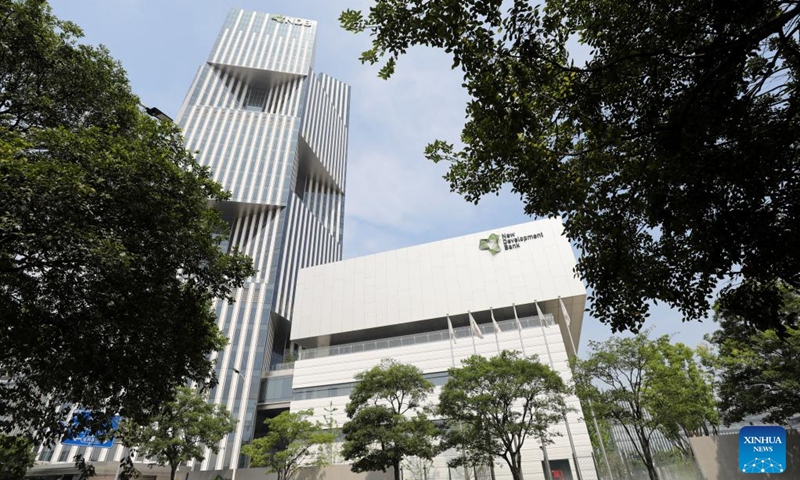
Photo taken on June 17, 2022 shows the headquarters building of the New Development Bank (NDB), also known as the BRICS bank, in east China's Shanghai.(Photo: Xinhua)
The bank said it will provide $30 billion of financial support to member countries from 2022 to 2026, with 40 percent of the funds to be used to mitigate global warming, the Xinhua News Agency reported.
South Africa's Trade, Industry and Competition Minister Ebrahim Patel encouraged BRICS members to increase investment in the country in sectors including wind and solar power, new-energy vehicles, and hydrogen energy and storage for sustainable development.
"Together with other BRICS members, we can initiate joint development projects through the Industrial Development Corp of South Africa," said Patel, noting that South Africa could be a gateway for other BRICS countries to enter the African market.
One example of green energy and climate resilience among BRICS nations is the Belo Monte phase II ultra-high-voltage (UHV) transmission project that is being funded, built and operated by the State Grid Corp of China in Brazil. Running over 2,500 kilometers through 81 cities in five states from north to south, the project involves the world's longest ±800kV ultra-high-voltage direct current transmission line that offers clean electricity to over 20 million locals.
In the digital field, the group has drawn up the BRICS Digital Economy Partnership Framework, emphasizing the commonalities and complementarities of BRICS members in the digital economy, while stressing the need to explore ways to leverage digital opportunities, accelerate digital transformation and create new drivers for sustainable development.
A report released by the Shanghai-based Fudan Development Institute at Fudan University on Tuesday pointed out that BRICS members should strengthen cooperation in terms of promoting digital infrastructure, improving digital trade governance and promoting the nurture of digital talent, among others, to inject sustainable momentum into the BRICS' own economic recovery and that of the world.
The digital economy - represented by cross-border e-commerce - has become a new highlight of economic and trade cooperation within the BRICS framework. Chinese official data showed that China's trade with other BRICS countries grew 12.1 percent year-on-year in the first five months, higher than the country's overall foreign trade growth rate.
Upholding the concept of openness, non-BRICS countries have been invited to the meeting for dialogue and exchanges since 2013.
As an innovative model of international cooperation, the "BRICS Plus" is a pragmatic arrangement that maintains resilience and flexibility, boosting all parties' participation in international cooperation in a comfortable way, said Shen Yi, a professor at Fudan University.
Shen said that the "BRICS Plus" system offers an effective approach to tackle the problem of uneven economic development and unequal economic status between developed and developing countries.
"Thanks to opportunities created by 'BRICS Plus' cooperation, emerging markets and developing countries will see their standing in the global economy elevated, which will also boost the optimization of their domestic economic structures and accordingly boost the evolution of the global market order," he said.
A total of 13 non-BRICS countries, including Thailand, Indonesia and Argentina, attended Wednesday's forum, with business groups expressing a strong willingness to boost cooperation with the bloc amid a volatile international environment and prolonged pandemic.
Loh Wee Keng, chairman of the Malaysian Chamber of Commerce and Industry in China, said on Wednesday that members of the chamber, including some of their peers in Malaysia, have been hit hard by the pandemic. "Therefore, we hope that through forums like this [BRICS Business Forum], cooperation like this, we can strengthen our joint economic planning in the post-epidemic era," said Loh.
In an example of BRICS' expanding cooperation with other emerging markets to tackle climate change and other global issues, Brazil-based mining giant Vale said its Indonesian branch PT Vale Indonesia Tbk entered into a framework cooperation agreement with China's Huayou Cobalt in April, to develop a high-pressure acid leaching processing facility in Pomalaa.
To reduce their carbon footprint, the companies agreed not to use captive or dedicated coal-fired power plants for any power source for the purpose of the Pomalaa project.
